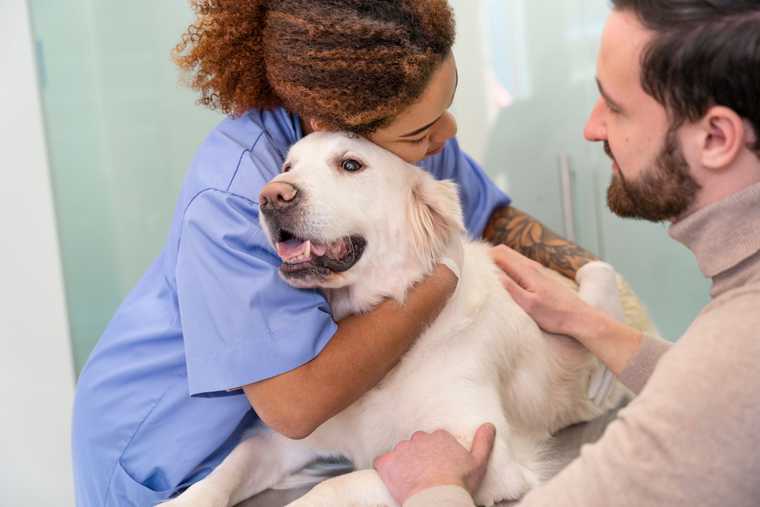Adopting a Senior Dog? All the Pros and Cons

Adopting an Older Dog? Here’s What You Need to Know
Adopting a dog is not a decision that should be taken lightly. You have to be even better prepared if you decide to adopt an older dog. Many people prefer to adopt puppies because they fear the challenges of adopting adult dogs. However, expanding your family by getting a senior four-legged companion has numerous overlooked advantages.
What you need to cope effectively with adjusting a senior dog to a new family life is up-to-date knowledge of what to expect and how to react to specific situations related to older dogs. Consider using the Woofz app to receive customized advice on training, feeding, and socializing with your dog properly.
Now, let's dive in and check the pros and cons of adopting a senior dog so that you can decide whether it is the right choice for you.

Why adopt a senior dog?
Adopting an adult dog has a lot of advantages that many pet owners are unaware of. Apart from being a special bonding experience, adding a senior canine to your family has numerous practical benefits. Here are some of them:
- They need less of your time and attention. Adopting old dogs is great for people who are busy working full-time and want to spend their evenings in peace and quiet. Older dogs are more likely to have calm and easy-going personalities as they have spent most of their energy chewing shoes and biting furniture during their reckless puppy phase.
- You know what you get. Adopting a senior dog is all about predictability, both character and size-wise. You have a chance to get to know a dog before bringing it home. So, their personality will not come as a surprise to you later on. The same can be said about physical appearance. You don’t risk your cute little dog growing into a 90-pound champ.
- They require less training. Typically, older dogs are trained to some extent, so a new owner will be spared at least the need to potty train a senior pooch. If your dog’s behavior still leaves room for improvement, don’t worry. Contrary to popular belief, old dogs can be taught new tricks. Nowadays, multiple tools, such as the Woofz app, can come to the rescue. It will provide you with a detailed personalized training plan for your dog.
It’s part of our human instinct to be attracted to cute, cuddly little creatures, whether babies, kittens, or puppies, so most people naturally are more prone to adopting a puppy. Let’s explore pup owners' challenges:
- Puppies are needy. Having a young puppy is pretty much the same as having a toddler — you must watch them wherever they go. The moment you’re not watching, they can get into trouble. For instance, they can pick up and eat something they shouldn’t, and you may end up rushing your pup immediately to a vet. Make sure you have enough time and enthusiasm to be super observant of your puppy.
- Get ready for the mess. Most of the puppies are not potty trained when a new family adopts them. Potty training doesn’t come naturally to all dogs and may require much time and effort. It also means you should be ready to clear up minor accidents every now and then. On top of that, keep in mind that you must deal with such completely normal parts of a puppy’s life as chewing and nibbling on different items in your house.
- You need to spend more. If you decide to adopt a puppy from a shelter, be ready to pay extra. Since older dogs are less in demand, their adoption fee is considerably smaller. If you adopt a puppy, you may need to pay as much as several hundred dollars. Moreover, puppies require vaccination, routine vet visits, and new accessories and toys. So, make sure you can afford to cover those expenses.

Possible cons of adopting an older dog
Despite the numerous advantages of adopting adult dogs, you should be aware of the possible disadvantages:
- They may have problems with other family members. Senior dogs have fully formed personalities. So, it’s not always easy for them to adapt to other pets your family has. It can be much more difficult for an adult dog to grasp a concept of a cat or even a small child. You need to be ready to spend extra time helping your dog form a bond with your family members.
- You may need to overcome a difficult background. You should check your dog’s background carefully to be fully aware of what challenging behavior you may face due to their previous traumatic experience they may be afraid of people or objects or be reactive toward some people). This is especially important for adult dogs adopted from a shelter. Dogs who were abandoned are prone to separation anxiety, so if your dog has a history of abandonment, you should prevent it from the moment you adopt them. An adjusting period may take longer for senior dogs, but they will likely eventually become fully integrated into your family life. Rescue dogs can be trained just as any other dogs you adopt.
- You need to be mindful of their activity level. Older dogs are known for being calmer and less energetic than puppies. It can create a false impression that you don’t need to provide your older dog with regular exercise. Consistent and moderate physical activity is extremely important to keep your dog's digestive and cardiovascular systems in optimal shape.
- They may develop more health issues. There’s a higher possibility that an older dog will need medical assistance. As they advance in age, dogs often develop chronicle conditions or dental issues that may require constant vet visits. It’s a good idea to check an older dog’s medical background to know what to pay attention to regarding their health status.

Possible challenges of adopting older dogs
We would also like to point out the emotional toll adopting an older dog can have on you.
As unpleasant as it sounds, unfortunately, some dogs have to be returned due to various issues the owners can’t resolve. Even though shelters do their best to find the right type of dog for each owner, occasionally, a mismatch can occur and dogs should be rehomed.
In addition, there’s an increased probability you will have to say goodbye to your senior furry friend sooner than you planned. It may have a devastating effect on you and your family, so, make sure you’re in the right mindset and are able to process the possible loss.
Wrap up
Adopting older dogs is both rewarding and challenging at the same time. More predictable, less active, and partially trained senior dogs are excellent friends for busy people who seek companionship. However, you should be aware of the possibility that an adult dog has behavioral and training issues, as well as medical conditions to take care of.
Don’t let those challenges scare you off. You will develop a special bond with your wise fluffy companion, which will make up for all the inconveniences. At the end of the day, what can be better than saving an experienced adult dog from a lonely life in a shelter? In return, you will get an infinite amount of unconditional love, loyalty, and fun.
FAQ
Is it worth adopting a senior dog?
Yes, definitely. If you are a dog person ready to care about a canine companion, don’t let age be a deciding factor.
How long does it take for a senior dog to adjust to a new home?
The 3-3-3 rule can characterize most dogs’ adjustment periods. First three days, you can expect your dog to be a bit lost and shocked. After the first three weeks, your dog will start feeling more at home, and by the end of three months after adoption, it will be fully integrated into your family routine.
At what age is a dog considered a senior?
It depends on a dog’s size. Small dogs are considered seniors at 12 years of age, while large breeds reach golden years at the age of 8.
Do older dogs bond with new owners?
Yes, regardless of age, a dog that is treated with love develops a strong bond with the owner.
Written by

Woofz Content Manager with a deep passion for dogs and a strong affinity for positive reinforcement training methods.
Reviewed by

Certified dog trainer, exclusive positive reinforcement methods & tackling aggression problems.